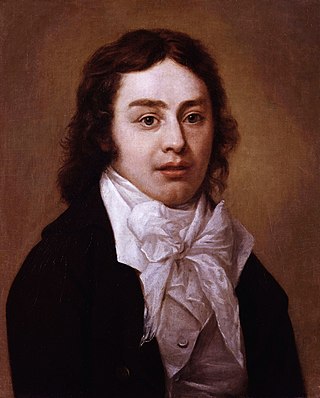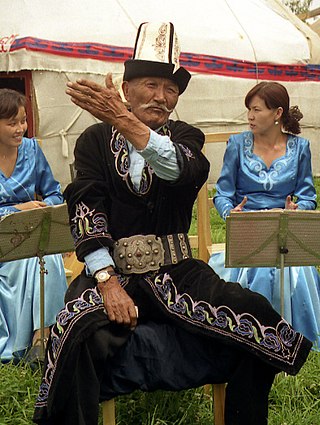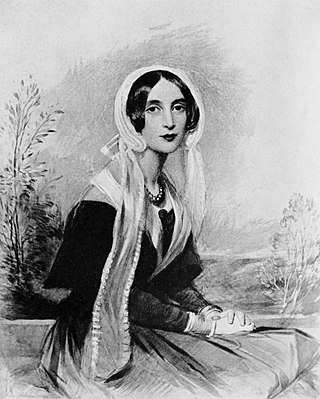
A ballad is a form of verse, often a narrative set to music. Ballads derive from the medieval French chanson balladée or ballade, which were originally "dance songs". Ballads were particularly characteristic of the popular poetry and song of Britain and Ireland from the Late Middle Ages until the 19th century. They were widely used across Europe, and later in Australia, North Africa, North America and South America.

Kubla Khan: or A Vision in a Dream is a poem written by Samuel Taylor Coleridge, completed in 1797 and published in 1816. It is sometimes given the subtitles "A Vision in a Dream" and "A Fragment." According to Coleridge's preface to Kubla Khan, the poem was composed one night after he experienced an opium-influenced dream after reading a work describing Shangdu, the summer capital of the Mongol-led Yuan dynasty of China founded by Kublai Khan. Upon waking, he set about writing lines of poetry that came to him from the dream until he was interrupted by "a person on business from Porlock". The poem could not be completed according to its original 200–300 line plan as the interruption caused him to forget the lines. He left it unpublished and kept it for private readings for his friends until 1816 when, at the prompting of Lord Byron, it was published.

Samuel Taylor Coleridge was an English poet, literary critic, philosopher, and theologian who, with his friend William Wordsworth, was a founder of the Romantic Movement in England and a member of the Lake Poets. He also shared volumes and collaborated with Charles Lamb, Robert Southey, and Charles Lloyd.

Oral tradition, or oral lore, is a form of human communication wherein knowledge, art, ideas and cultural material is received, preserved, and transmitted orally from one generation to another. The transmission is through speech or song and may include folktales, ballads, chants, prose or poetry. In this way, it is possible for a society to transmit oral history, oral literature, oral law and other knowledge across generations without a writing system, or in parallel to a writing system. Religions such as Buddhism, Hinduism, Catholicism, and Jainism, for example, have used an oral tradition, in parallel to a writing system, to transmit their canonical scriptures, rituals, hymns and mythologies from one generation to the next. Sub-Saharan African societies have broadly been labelled as "oral civilisations", contrasted with "literate civilisations", due to the emphasis placed on oral tradition and the important place it has in their cultures.

Shangdu, also known as Xanadu, was the summer capital of the Yuan dynasty of China before Kublai moved his throne to the former Jin dynasty capital of Zhōngdū which was renamed Khanbaliq. Shangdu is located in the present-day Zhenglan Banner, Inner Mongolia. In June 2012, it was made a World Heritage Site for its historical importance and for the unique blending of Mongolian and Chinese culture.

Colley Cibber was an English actor-manager, playwright and Poet Laureate. His colourful memoir An Apology for the Life of Colley Cibber (1740) describes his life in a personal, anecdotal and even rambling style. He wrote 25 plays for his own company at Drury Lane, half of which were adapted from various sources, which led Robert Lowe and Alexander Pope, among others, to criticise his "miserable mutilation" of "crucified Molière [and] hapless Shakespeare".
This article contains information about the literary events and publications of 1730.
This article contains information about the literary events and publications of 1696.
The Compass Players was an improvisational theatre revue active from 1955 to 1958 in Chicago and St. Louis. Founded by David Shepherd and Paul Sills, it is considered to be the first improvisational theater in the United States.

The Toccata and Fugue in D minor, BWV 565, is a composition for organ by, according to the oldest sources, German composer Johann Sebastian Bach and is one of the most widely recognisable works in the organ repertoire. Although the date of its origin is unknown, scholars have suggested between 1704 and the 1750s. The piece opens with a toccata section followed by a fugue that ends in a coda, and is largely typical of the north German organ school of the Baroque era.

Dubliners is a collection of fifteen short stories by James Joyce, first published in 1914. It presents a naturalistic depiction of Irish middle class life in and around Dublin in the early years of the 20th century.

Sara Coleridge was an English author and translator. She was the third child and only daughter of the poet Samuel Taylor Coleridge and his wife Sara Fricker.
"Araby" is a short story by James Joyce published in his 1914 collection Dubliners. The story traces a young boy's infatuation with his friend's sister.

The Partita in D minor for solo violin by Johann Sebastian Bach was written between 1717 and 1720. It is a part of his compositional cycle called Sonatas and Partitas for Solo Violin.

Christabel is a long narrative ballad by Samuel Taylor Coleridge, in two parts. The first part was reputedly written in 1797, and the second in 1800. Coleridge planned three additional parts, but these were never completed. Coleridge prepared for the first two parts to be published in the 1800 edition of Lyrical Ballads, his collection of poems with William Wordsworth, but left it out on Wordsworth's advice. The exclusion of the poem, coupled with his inability to finish it, left Coleridge in doubt about his poetical power. It was published in a pamphlet in 1816, alongside Kubla Khan and The Pains of Sleep.
Danger music is an experimental form of avant-garde 20th and 21st century music and performance art. It is based on the concept that some pieces of music can or will harm either the listener or the performer, understanding that the piece in question may or may not be performed. Kyle Gann describes in his book Music Downtown: Writings from the Village Voice how Takehisa Kosugi's composition Music for a Revolution directs the performer to "[s]coop out one of your eyes 5 years from now and do the same with the other eye 5 years later". Works such as this are also sometimes referred to as anti-music because they seem to rebel against the concept of music itself. Danger music is often closely associated with the Fluxus school of composition, especially the work of Dick Higgins who composed a series of works entitled Danger Music.
The Moon and Serpent Grand Egyptian Theatre of Marvels is a group of occultists and performers including writer and magician Alan Moore, Bauhaus member David J, and musician Tim Perkins, who perform occult "workings" consisting of prose poetry set to music. Several of these "workings" have been released onto CD. It was also the name of the group's first performance piece which was released as a spoken word CD in 1996.
Christabel is a 2001 avant-garde experimental film directed by James Fotopoulos and based on the unfinished poem of the same name by Samuel Taylor Coleridge.
This is a summary of 1901 in music in the United Kingdom.
Alan Warren Friedman is Thaman Professor of English and Comparative Literature in the department of English at the University of Texas at Austin. He is a specialist in the work of James Joyce and Samuel Beckett.











